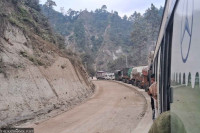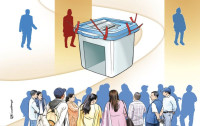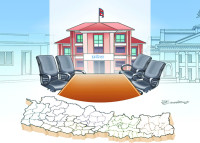Opinion
Citizens and capital
Nepal should develop a financial policy to utilise the liquid capital of its citizens for national development
Prakash Bom
From a strictly economic and political perspective, why hasn’t Nepal been able to initiate public discourse on an economic policy that will entitle citizens to invest in national development? The government, always running after foreign investment though its financial institutions, is sitting on large deposits of idle money. Besides, foreign investment agreements made in US dollars, such as power purchase agreements (PPAs) of the Nepal Electricity Authority, have made native products more expensive because of currency depreciation and higher interest rates.
Huge amounts of capital in liquidity are sitting idle in financial institutions, human resources in plight are seeking jobs abroad and only 10 percent of the total water resources is currently used. Yet, lawmakers, ministers, planners, experts and citizens continue to think that the grass is greener on the other side. We should instead look into how much investment capital can be raised from Nepali citizens if the government can develop a financial policy that entitles citizens to make national investments on a voluntary basis, which will yield pension and healthcare in return after retirement.
Look west
In most developed countries, such a financial policy is mandated and called ‘entitlement’. It generates investments for national development (infrastructures and hydropower) at less than 12 percent of the earnings of citizens. There is no need to copy the same policy in Nepal. Instead, a new provision can be developed to help citizens save a certain percentage of their earnings to invest in national development voluntarily.
The current dependency of the government on foreign capital and expertise is regrettable. It should instead learn from developed nations’ public financing policies, such as the United States’ Social Security Fund, which makes it mandatory for all working individuals to deposit 12 percent of their income (worker contribution 6 percent and employer 6 percent). The reason the US, Canada and other European nations have remained rich for over a century is because they developed their financial systems. Imagine the funds that can be collected even if there are just 150 million working individuals with an average income of $3000 a month. This is $3000 x 12 percent x 150 million, which equals $54 billion and amounts to $648 billion annually. The US government returns payment and services only to retirees; the rest of the fund is invested in the economy.
An entitlement law
Can the Nepali government also adopt such a financial policy? If it can, then in that case, if 10 million participants invest Rs 1,000 each month, $100 million will be collected in one month and $1.2 billion annually.
For this, the policy the government adopts must become an ‘Entitlement Law’, to be implemented by the Nepal Rastra Bank. The law must authorise the central bank to allow individual Nepali citizens to open up an investment savings account. People should be able to do so easily by presenting one’s Citizenship Identity Card at any commercial bank. The law must then mandate the government to invest the fund under a Citizens’ Entitlement Law for national development. In return, the government can pay back a sanctioned interest and dividend based on the growth of the GDP or the difference of the annual percent rate from the sanctioned interest rate. The law must also authorise the central bank to be the guarantor of the fund so that it has the authority to secure, manage, and guarantee returns as per the law.
The law should allow individual Nepali citizens to open an individual account with a minimum of Rs 1,000 for 10 years’ investment saving commitment. Once an account is opened, the individual can make deposits of any amount at any time in the lifetime of the account (until retirement age), provided that the balance does not exceed the limit set by the law, for instance, Rs 10 million. Accumulations of interest and dividend will depend on the balance an individual has in their account before their official date of retirement.
Such a policy, in addition to building the nation and helping it become independent, has multifaceted advantages. It will help generate jobs and help utilise natural resources. As a result, the nation will become prosperous by investing its own capital. It will help citizens save and earn profits for their retirement with state-funded free healthcare incentive as long as they live. Additionally, the policy will eventually minimise foreign loans and investments by fulfilling the nation’s primary responsibility to make its citizens prosperous. This financial policy must be made a public discourse in our homes, schools, institutions and Parliament.
Bom is associated with the Non-Resident Nepali Association, New York, the US




 5.44°C Kathmandu
5.44°C Kathmandu












